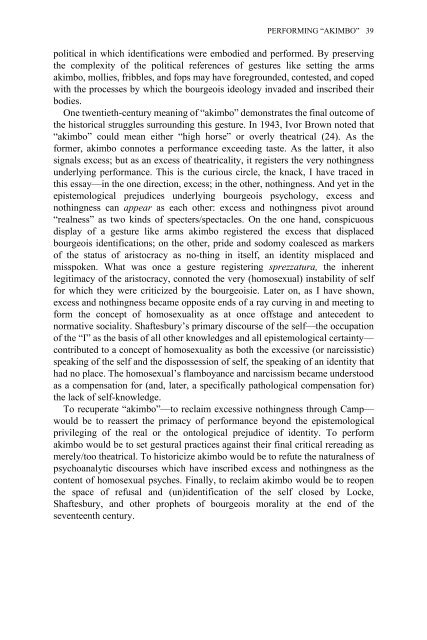Edited by Moe Meyer - Get a Free Blog
Edited by Moe Meyer - Get a Free Blog
Edited by Moe Meyer - Get a Free Blog
You also want an ePaper? Increase the reach of your titles
YUMPU automatically turns print PDFs into web optimized ePapers that Google loves.
PERFORMING “AKIMBO” 39<br />
political in which identifications were embodied and performed. By preserving<br />
the complexity of the political references of gestures like setting the arms<br />
akimbo, mollies, fribbles, and fops may have foregrounded, contested, and coped<br />
with the processes <strong>by</strong> which the bourgeois ideology invaded and inscribed their<br />
bodies.<br />
One twentieth-century meaning of “akimbo” demonstrates the final outcome of<br />
the historical struggles surrounding this gesture. In 1943, Ivor Brown noted that<br />
“akimbo” could mean either “high horse” or overly theatrical (24). As the<br />
former, akimbo connotes a performance exceeding taste. As the latter, it also<br />
signals excess; but as an excess of theatricality, it registers the very nothingness<br />
underlying performance. This is the curious circle, the knack, I have traced in<br />
this essay—in the one direction, excess; in the other, nothingness. And yet in the<br />
epistemological prejudices underlying bourgeois psychology, excess and<br />
nothingness can appear as each other: excess and nothingness pivot around<br />
“realness” as two kinds of specters/spectacles. On the one hand, conspicuous<br />
display of a gesture like arms akimbo registered the excess that displaced<br />
bourgeois identifications; on the other, pride and sodomy coalesced as markers<br />
of the status of aristocracy as no-thing in itself, an identity misplaced and<br />
misspoken. What was once a gesture registering sprezzatura, the inherent<br />
legitimacy of the aristocracy, connoted the very (homosexual) instability of self<br />
for which they were criticized <strong>by</strong> the bourgeoisie. Later on, as I have shown,<br />
excess and nothingness became opposite ends of a ray curving in and meeting to<br />
form the concept of homosexuality as at once offstage and antecedent to<br />
normative sociality. Shaftesbury’s primary discourse of the self—the occupation<br />
of the “I” as the basis of all other knowledges and all epistemological certainty—<br />
contributed to a concept of homosexuality as both the excessive (or narcissistic)<br />
speaking of the self and the dispossession of self, the speaking of an identity that<br />
had no place. The homosexual’s flamboyance and narcissism became understood<br />
as a compensation for (and, later, a specifically pathological compensation for)<br />
the lack of self-knowledge.<br />
To recuperate “akimbo”—to reclaim excessive nothingness through Camp—<br />
would be to reassert the primacy of performance beyond the epistemological<br />
privileging of the real or the ontological prejudice of identity. To perform<br />
akimbo would be to set gestural practices against their final critical rereading as<br />
merely/too theatrical. To historicize akimbo would be to refute the naturalness of<br />
psychoanalytic discourses which have inscribed excess and nothingness as the<br />
content of homosexual psyches. Finally, to reclaim akimbo would be to reopen<br />
the space of refusal and (un)identification of the self closed <strong>by</strong> Locke,<br />
Shaftesbury, and other prophets of bourgeois morality at the end of the<br />
seventeenth century.


